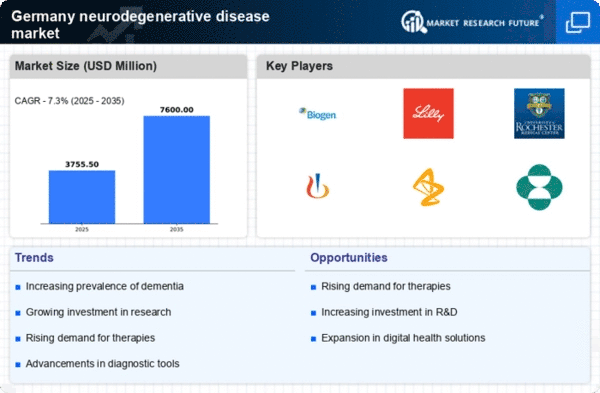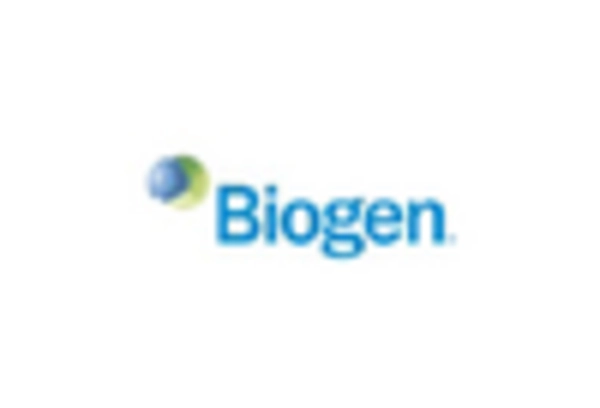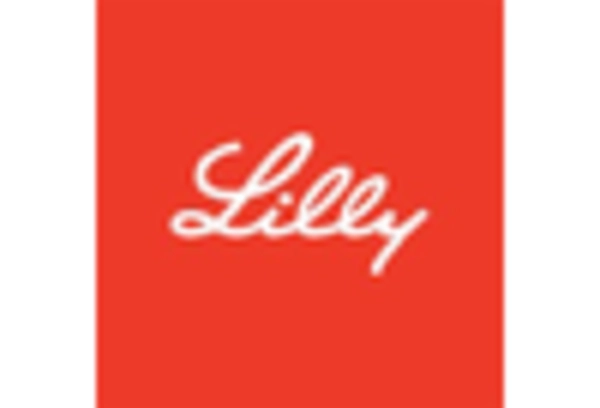Rising Awareness and Advocacy
There is a growing awareness and advocacy surrounding neurodegenerative diseases in Germany, which serves as a significant driver for the market. Non-profit organizations and patient advocacy groups are actively working to educate the public about these conditions, leading to earlier diagnosis and treatment. Increased awareness has also prompted discussions about funding and policy changes, which could enhance support for research and patient care. As more individuals become informed about the symptoms and impacts of neurodegenerative disorders, the demand for diagnostic tools and therapeutic options is likely to rise, positively impacting the neurodegenerative disease market.
Supportive Regulatory Environment
A supportive regulatory environment in Germany is fostering growth in the neurodegenerative disease market. Regulatory bodies are increasingly recognizing the urgency of addressing neurodegenerative disorders and are streamlining approval processes for new therapies. Initiatives aimed at expediting the review of innovative treatments are likely to encourage pharmaceutical companies to invest in research and development. Moreover, the German Medicines Agency is actively engaging with stakeholders to ensure that patient needs are met, which could lead to a more robust market for neurodegenerative disease therapies. This regulatory support is essential for driving innovation and ensuring that effective treatments reach patients in a timely manner.
Aging Population and Increased Incidence
The aging population in Germany is a critical driver for the neurodegenerative disease market. As individuals age, the risk of developing neurodegenerative disorders such as Alzheimer's and Parkinson's increases significantly. Current statistics indicate that approximately 1.6 million people in Germany are living with dementia, a figure that is projected to rise as the population ages. This demographic shift is likely to create a heightened demand for therapeutic interventions and support services, thereby expanding the market. Furthermore, the increasing burden on healthcare systems due to the rising incidence of these diseases necessitates innovative solutions and funding, which could further stimulate growth in the neurodegenerative disease market.
Technological Advancements in Diagnostics
Technological advancements in diagnostics are transforming the landscape of the neurodegenerative disease market. Innovations such as advanced imaging techniques and biomarker identification are enabling earlier and more accurate diagnoses. In Germany, the integration of artificial intelligence in diagnostic processes is gaining traction, potentially improving patient outcomes. These advancements not only facilitate timely intervention but also enhance the understanding of disease progression, which is crucial for developing effective treatments. As diagnostic capabilities improve, the neurodegenerative disease market is expected to expand, driven by the need for innovative solutions that cater to the evolving healthcare landscape.
Growing Investment in Research and Development
Investment in research and development (R&D) is a pivotal factor influencing the neurodegenerative disease market. In Germany, public and private sectors are increasingly allocating funds to explore novel treatment options and improve existing therapies. For instance, the German government has committed over €1 billion to research initiatives aimed at understanding the mechanisms of neurodegenerative diseases. This financial support is expected to foster innovation, leading to the development of new drugs and therapies. Additionally, collaborations between academic institutions and pharmaceutical companies are likely to enhance the pipeline of potential treatments, thereby driving growth in the neurodegenerative disease market.
















